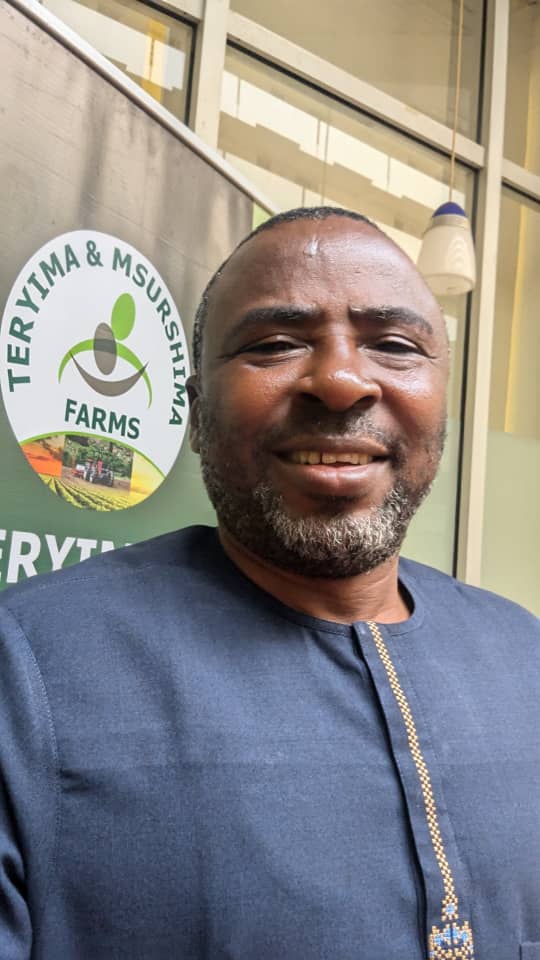Vitalis Tarnongu, a prominent farmer in Benue State is the Chief Executive Officer (CEO) of Teryima Nigeria Limited. From a humble beginning in farming, Tarnongu today remains a name to reckon with in the agricultural industry. He shares insight about his journey to become a large producer of rice, maize, cowpea amongst other crop in this exclusive interview with Nigeria Project.
By Winnie Onu, Makurdi
Let’s talk about your personal journey. How did you get into farming?
I was working at the Federal University of Agriculture, Makurdi, when USAID’s MARKETS project approached us in 2007. Out of interest, I attended their rice farming training. In 2008, I planted one hectare and harvested three metric tonnes. That success changed my outlook. I expanded to 10 hectares, took a N1.5 million loan from First Bank, and despite losing 90 percent of my crop to drought and flood, I repaid it in full. Later, I accessed N3 million from Diamond Bank and diversified into sesame, soybean, and maize.
What role did the MARKETS projects play in your growth?
They were transformative. They taught me agronomic best practices and basic business principles, like doing market surveys and buying inputs during the off-season. By applying these, I expanded to 40 hectares, increased yields to 4–5 MT/ha, and began supplying processors like Olam, MIKAP, Ebony Agra, and UMZA Rice Mill.
So, how did Teryima Nigeria Limited begin?
Teryima Nigeria Limited started in 2007 as a small farmers’ group called Sabongida U Pillah Multipurpose Cooperative Society. We were just a few farmers producing rice and maize. Later, we transformed into Teryima Multipurpose Cooperative Society Limited and expanded to include cassava farmers from Guma Local Government. Our membership grew to over 300 farmers. In February 2013, we became Teryima Nigeria Limited, formally incorporated under the Companies and Allied Matters Act (CAMA) of 1990.
What difference did incorporation under CAMA make for your operations?
Incorporation gave us legal identity and credibility. It allowed us to enter formal contracts, access loans, and partner with both local and international organisations. It also meant we could scale from being just a cooperative to a structured agribusiness with accountability under the law.
What were some of the early challenges the company faced?
In 2012, we lost 200 hectares of paddy rice to floods, about 100 hectares at the Lower Benue Project Farm and another 100 hectares in Iye, Guma LGA. In 2014, herdsmen invaded our farms, and we couldn’t distribute seeds that year. But challenges are part of business, and we’ve always bounced back stronger.
How do you manage risks like floods, drought, or invasions, considering your past losses?
Risk is part of farming. We now practise staggered planting, invest in early generation seeds, and use improved irrigation and crop protection methods. Legally, we also insure our farms where possible. Most importantly, we have built strong partnerships to cushion shocks when disasters strike.
What is the company’s main objective today?
Our focus is on food sufficiency and professional agricultural services. We produce rice, maize, sesame, soybeans, and vegetables. We also do semi-processing, marketing, and training of farmers. Beyond farming, we aim to empower rural farmers especially women and youths by giving them access to inputs, training, and markets.
Teryima Nigeria has partnered with the Federal University of Agriculture, Makurdi. Can you explain that?
In 2020, we signed a 5-year partnership with FUAM to produce Early Generation Seeds for rice, maize, soybeans, and cowpea. The idea is to guarantee that our farmers get quality seeds for better yields.
You also have international partners. What do these collaborations involve legally and practically?
We have partnerships with BICCO Agro Products (WA), UPL Ltd, Syngenta Nigeria, Agri Life India, Charis Life Sciences, and others. These partnerships are formalised through Memorandums of Understanding (MoUs) and service contracts. They involve technology transfer, seed supply, crop protection solutions, and training. Legally, it ensures both sides are bound to deliver value.
Many farmers struggle with access to finance. How has your company handled this legally and financially?
Our credibility comes from keeping our word. We repay every loan, even when we face losses. That builds trust with banks. We also enter into structured agreements with off-takers and processors, which give lenders confidence that our produce will be sold.
Beyond business, how are you impacting your community?
After herder-farmer clashes displaced people, I distributed two kilograms of rice seed each to 2,000 displaced farmers. Currently, I work with about 400 farmers, providing them with seeds, technical assistance, and guaranteed buyback. We also use demo plots to teach them modern practices.
How has farming changed your personal life?
Farming gave me a life I never dreamed of. I’ve been able to buy two houses in Makurdi, own three SUVs, and educate both my children and younger siblings. If I had relied only on my university job, this would not have been possible.
Looking ahead, what’s your vision for Teryima Nigeria Limited?
I want us to become a major supplier of produce to big processors nationwide. Agriculture has shown me endless opportunities, and with the right partnerships, I believe we can achieve even more.
Who would you credit for supporting your success?
Syngenta Nigeria deserves special mention. They’ve supported us with quality crop protection products and agronomic practices. Their role has been instrumental in our achievements.

